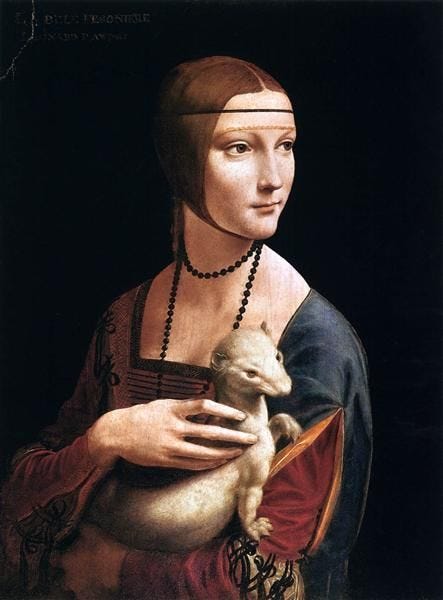RIP Da Vinci. You Would’ve Loved AI
Some thoughts on AI, creativity, and why being into “too many things” might finally pay off.
“A human being should be able to change a diaper, plan an invasion, butcher a hog, conn a ship... specialization is for insects.”
— Robert A. Heinlein
What do you want to be when you grow up?
As a kid, I was asked this question so many times that I became deaf to it.
It became background noise.
Other kids always had answers ready:
“Doctor.”
“Pilot.”
“President.”
Me? I didn’t know.
Worse, I was scared to make something up.
Like the universe would overhear me and lock me into a life I didn’t want.
I didn’t want to be good at one thing.
I wanted to be good at many things.
But here’s the problem:
The world doesn’t like that.
For decades, the system has been obsessed with specialists.
Be the best at one thing. Sharpen the blade.
Don’t be a jack of all trades.
Because in the corporate world, specialists win.
It makes sense, though.
If you’re running a company, you want specialists.
The best of the best in their field.
And you’ll pay top dollar for that, a concentrated dose of expertise you can’t get anywhere else.
An S-tier specialist in their field can run laps around a team of A- or B-tier folks.
So if you wanted to get rich, the formula was clear:
Go to school.
Get reallllly good at one thing.
Do said thing for a long time.
Get hired by a big tech company for a fat paycheck.
But now… something’s changed.
AI.
Large Language Models have combined thousands of years of human knowledge and processing power, and made it accessible to everyone.
Not just companies. Not just the elite.
Everyone.
Companies no longer need to pay for high-level consulting.
They can get it for the best price ever: Free 99.
AI has destroyed the specialist.
Why?
Because specialists have always had one major chink in their armor:
They’re replaceable.
Their value came from knowledge.
And now? Knowledge is free.
“The creative adult is the child who survived.”
— Ursula K. Le Guin
The Human Variable
What makes two specialists different?
Experience. That’s it.
Every one of the 8 billion people on this planet lives through something different every single day.
Sometimes it’s a life-altering lesson.
Other times, just a strange little interaction on a Tuesday that teaches you something only you will ever understand.
But it all adds up.
It becomes your edge.
Experience.
Emotion.
Memory.
All of it comes together to form the lens through which you see the world.
But with how fast AI is evolving and AGI on the horizon, that gap between us and machines is getting thinner by the day.
Enter: the Polymath
Polymaths are AI’s worst nightmare.
They don’t think in straight lines.
They think in constellations.
Not just coders.
But also chess players.
Boxers. Marketers. Philosophers. Mechanics. Storytellers.
They don’t rely on one skill; they combine skills.
They apply context from one domain to another.
They build bridges between ideas that were never meant to meet.
They don’t just view the world through one lens.
They’re not just aerospace engineers. Or doctors. Or devs.
They’re all of those things plus five others that don’t even seem related.
And that’s the point.
AI becomes their co-pilot, not their competition.
It patches up gaps in their knowledge.
It pressure-tests unorthodox ideas.
It strengthens their creativity, not replaces it.
Because their identity isn’t tied to being “the best” at one thing.
They don’t feel like they’re cheating.
They’re just building, with a better toolbox.

Depth Over Dabbling
Okay, so AI killed the specialist.
But it’s not running off with the generalist either.
Just because you know many things doesn’t mean you’re good at any of them.
Here’s where the line gets drawn:
A generalist knows a little about a lot.
That doesn’t make them useful.
A polymath knows a handful of things very well.
And more importantly, knows how to combine them.
They despise mediocrity.
They scoff at the useless perfectionism that specialists chase.
They seek constant, obsessive improvement in the things they actually care about, however many those things might be.
The best example?
Leonardo da Vinci.
He studied and practiced a ridiculous number of disciplines (painting, anatomy, architecture, engineering, music).
But he wasn’t the best at any of them.
Painting? Raphael had him beat.
Sculpture? Michelangelo.
But Da Vinci?
He was dangerously above average at everything.
Curious. Restless. Obsessed.
Now imagine if Da Vinci had GPT-5.
Game fucking over.
So what now?
It’s 2025.
The world is changing fast, and I’m not scared.
I’m excited. And you should be too.
The future is bright, and not from a nuclear flash, tempting as that might be if it meant dodging taxes.
No.
The future is bright for those who embrace AI not as a threat… but as a tool.
For the first time ever, the polymath wins.
The stuff that used to take years to master?
Now takes minutes to simulate.
You don’t need to carry it all in your head.
You just need taste. Curiosity. Drive.
A reason to create.
You can paint whatever you want.
Build whatever app you dream up.
Write scripts. Score films. Design sneakers. Launch a product.
And the people who rise to the top?
They’ll be the ones who’ve spent years building their inner worlds.
Offline.
Through real experiences.
Through boredom. Solitude. Curiosity.
Through long hours of thinking deeply and doing things just because.
AI will give them superpowers.
Because their taste is sharp.
Their vision is clear.
Their creativity is personal. Lived. True.
The gap between idea and execution has collapsed.
From years to months, and soon? From days to hours.
AI isn’t for consumers. It’s for creators.
And for the first time ever, the weirdos who never picked one thing finally have the upper hand.
Specialists built the old world. Polymaths will build what’s next
“Don’t aim to be the best at one thing. Be dangerously competent at many.”
— Naval




Great read. Always thought being a jack of all trades meant I wasn’t competent. Vilified as ‘the master of none’ or never consistent enough to put in those 10,000 hours. Now the AI deluge is here to sweep all specialists away.
Happy to be a weirdo! Great post.